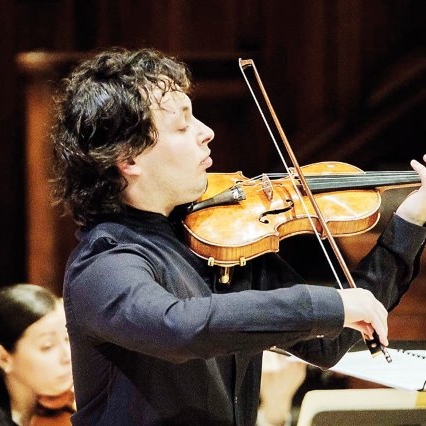
Featured Item

Jewish American violinist pays flying visit to Cape Town Philharmonic
MOIRA SCHNEIDER
“Usually when I travel to a city, my management finds ways to connect me to the community, both Jewish and general. I’ll teach a master class,” he told the SA Jewish Report in a Skype interview after he left.
“It sometimes happens – you fly somewhere, you play a concert or two, you leave, and don’t really get to be a part of the community at all. I’m not a big fan of that.”
It was because he enjoyed playing with the Cape Town Philharmonic Orchestra two years ago, that he wanted to return to do this again. “I like the orchestra, the musicians, the administration, the city hall,” he says.
Kutik has played with some of the world’s major orchestras. It was, however, his performance of Oyfn Pripetchik in front of 10 000 people during the March of the Living in Poland in April that tugged at his heartstrings.
“Doing something so emotional, so personal, in a location that draws up so much memory, history and obviously, pain for the Jewish people, for my heritage, is a very different feeling, much more personal,” he says. “It was an emotion-filled experience.”
The song is about a rabbi teaching his young students the aleph-bet. By the end of the 19th century it was one of the most popular songs of the Jews of Central and Eastern Europe, and as such, it is a major musical memory of pre-Holocaust Europe.
The emotive Oyfn Pripetchik was one of the pieces that he played to a spellbound audience at the SA Jewish Museum on 5 November.
Born in Minsk, Belarus, Kutik immigrated to the United States with his family in 1990 at the age of five. He is now based in Boston.
The 33-year-old hails from a very musical family. His mother was his first teacher when he started learning to play the violin at age five; his father and grandfather were trumpet players in the Belarusian Symphony Orchestra.
“I was surrounded by music from age zero,” he says. “They say I showed an interest in music from a very, very early age. I have to believe them, I don’t remember.”
His parents left the Soviet Union because of the “horrific” anti-Semitism they experienced there. His mother had been fired from a job, being told that the organisation had already reached its quota of Jewish employees.
“Even in pre-school, when [my parents] would take me,” Kutik relates, “they started noticing that the parents of the other children singled me out as the Jewish one. Stuff like that really pushed them over the edge.”
When his family arrived in the US, he says, “we were very much supported by the umbrella organisation that encompasses hundreds of small Jewish communities across the US”.
“What they did for my family personally in the months, weeks, day of our arrival, and years after, was so profound in terms of support in restarting our lives. They really became a second family to me and my family. It’s something I’ve lived with, processed, and been aware of my whole life in everything that I do.
“Being able to travel around for Jewish federations was really the very least I could do to give back. That involved playing for various communities across the country, and telling them about our experience to be living proof of the work that they do, and inspire them to continue.”
With all the distractions of the modern age, are young people still interested in classical music? “Yes,” he says, “but it’s a challenge. It used to be that everybody played a musical instrument for a couple of years in their education. I’m seeing more and more how important that education is, especially elementary education.
“Personally speaking, purely about the US, I find it tragic how in so many communities, when there are budget cuts, you start with the arts. I know that very well from my mom being a teacher in public school, and seeing communities across the country cut their arts budgets.
“Having said that, I do think that on the flipside – YouTube, the Internet, iTunes – the ease of downloading a fantastic performance has made classical music probably more widely listened to than ever before. It’s effortless now to go and listen to Brahms Symphony No. 2 – it’ll take you literally five seconds, and the move of one muscle in your body.
“More and more people are hearing [classical] music, they’re just hearing it on their own terms. Most people don’t have 40 minutes to listen to a Brahms symphony. Some people have five minutes that they want to spend listening to a part of that symphony, and when they have some more time, they’ll listen to five more minutes of it.
“Music is consumed in a different way. It’s more accessible. It’s our responsibility as artists to find a way to modernise reaching out to these audiences. We have to use the tools at our disposal, new technology, new avenues of distribution, and new platforms.”
His latest project, Meditations on Family, involves the release of very short pieces online on a weekly basis from 18 January. “It will be a living archive devoted to exploring family, memory, heritage, and immigration, through a series of eight short works.
“The goal is to try and convince people to spend two minutes of their week with me, to absorb the material, and then come back the next week,” he says.




